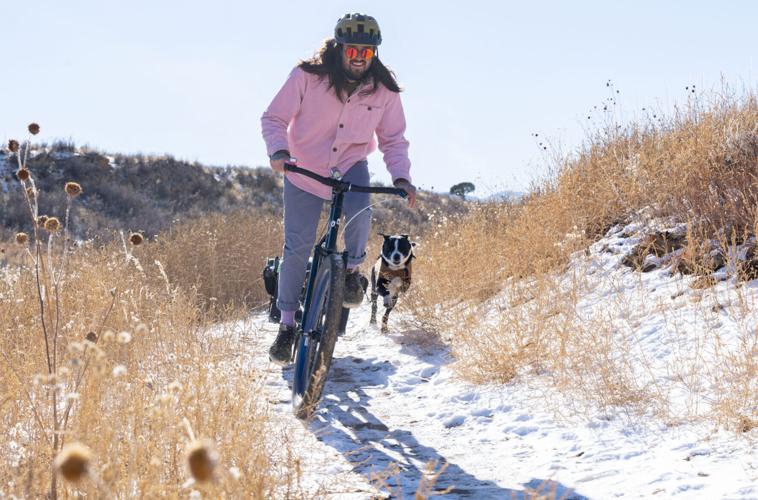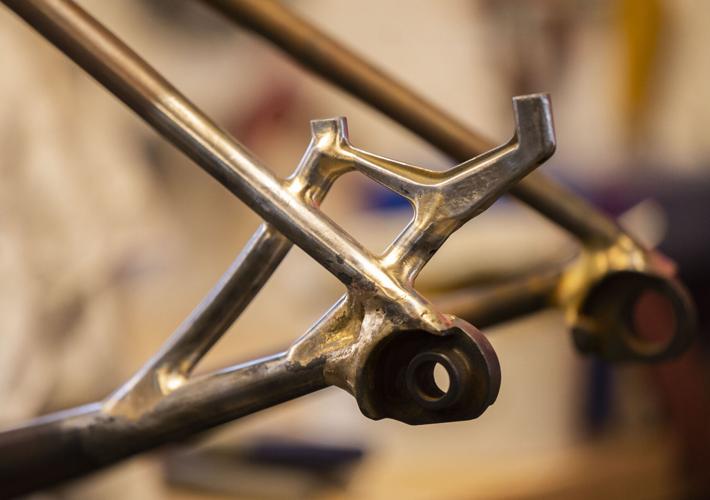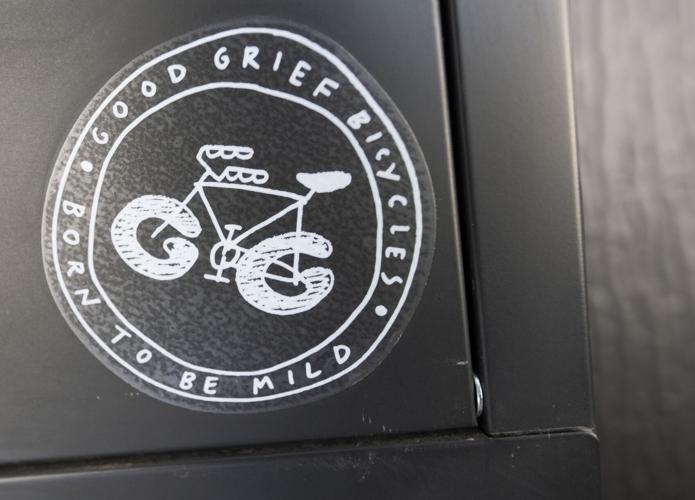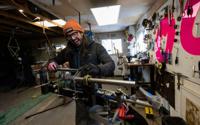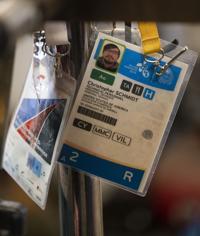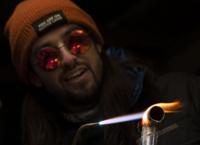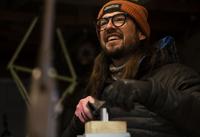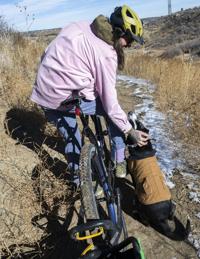With ‘Good Grief,’ a Colorado Springs cyclist finds his happy place
Growing up, Chris Schmidt was always compared to his grandfather. Norman Cheekū did things the hard way — working his big, 6-foot-5 body hard until injury ended pro football hopes, later working hard and standing firm for his people in his Bureau of Indian Affairs post.
“Everybody always said, ‘You’re stubborn like your grandpa,’” Schmidt says.
There are sides to stubbornness, Schmidt knows. “It’s a really good thing sometimes,” he says, “and a really bad thing sometimes.”
Good for beneficial habits. Bad for habits that harm. Schmidt, 36, has known both.
What he’s never been able to shake: a healthy obsession with bicycles.
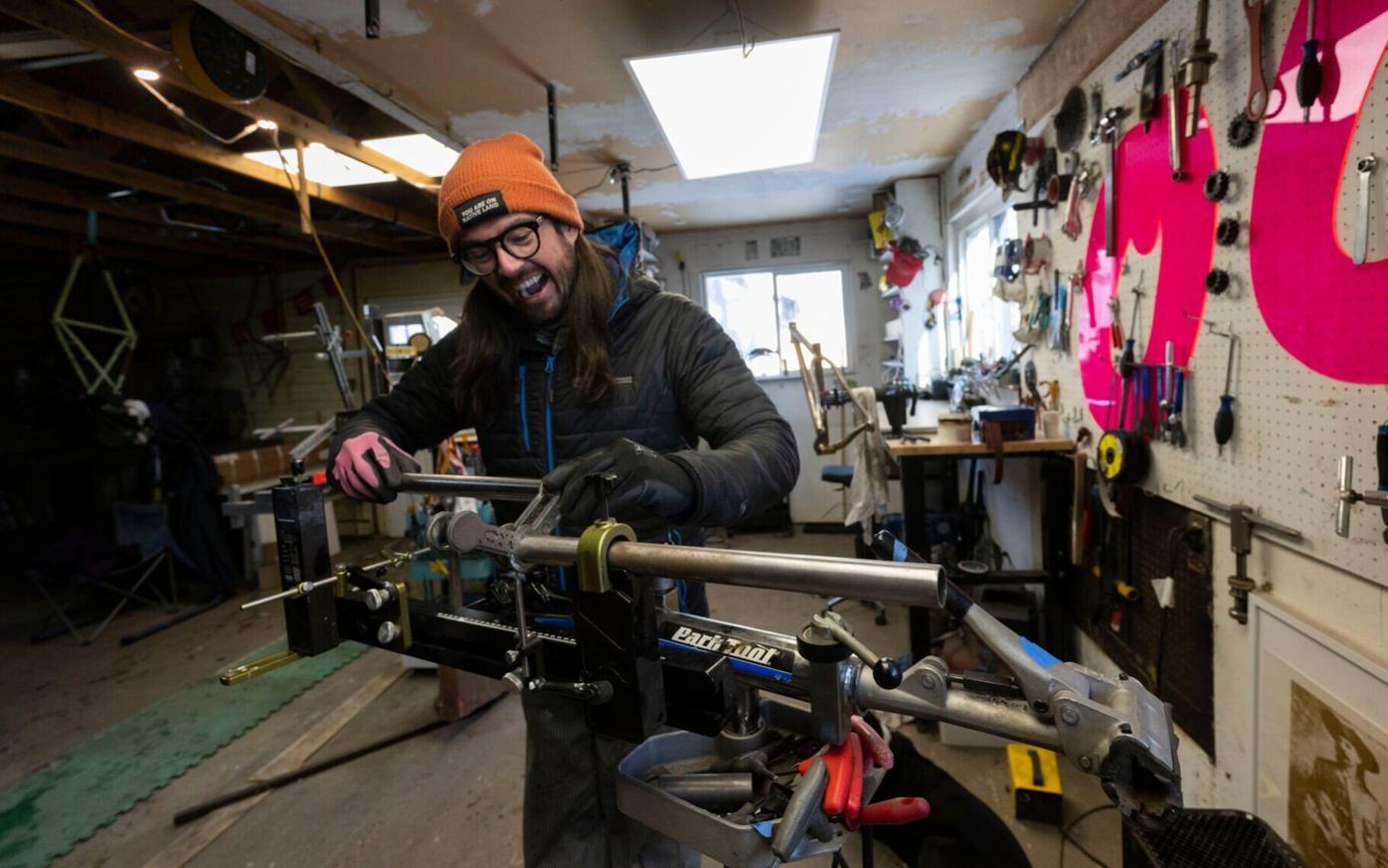
Chris Schmidt builds a front fork in his shop Friday, Jan.. 5, 2024, at his Colorado Springs home. “I try to over-engineer every measurement I need so that I have a million different points I can look at,” Schmidt says.
Christian Murdock/The Gazette

Chris Schmidt builds a front fork in his shop Friday, Jan.. 5, 2024, at his Colorado Springs home. “I try to over-engineer every measurement I need so that I have a million different points I can look at,” Schmidt says.
“Healthy” might be a relative term. You’d be hard-pressed to find anyone riding a fixed-gear bike for days and nights in the mountains.
Schmidt turned heads around the cycling world for one such outing in 2020: a five-day push across the Colorado Trail on the bike more associated with roads and velodromes. “Fixies” are bare-bones, single-speed bikes without the suspension and other helpful components to negotiate harsh terrain.
No need for Schmidt. “An absolute masochist,” his wife, Lauren Memarian, lovingly calls him.
Schmidt spent the better part of the last decade working for the U.S. Olympic & Paralympic Committee, serving as a mechanic for the national team and point person at the Springs velodrome. It’s easy to think the time around elites inspired him to push his own limits.
But no, the passion is deeply personal, says a close friend and colleague from those Olympic days.
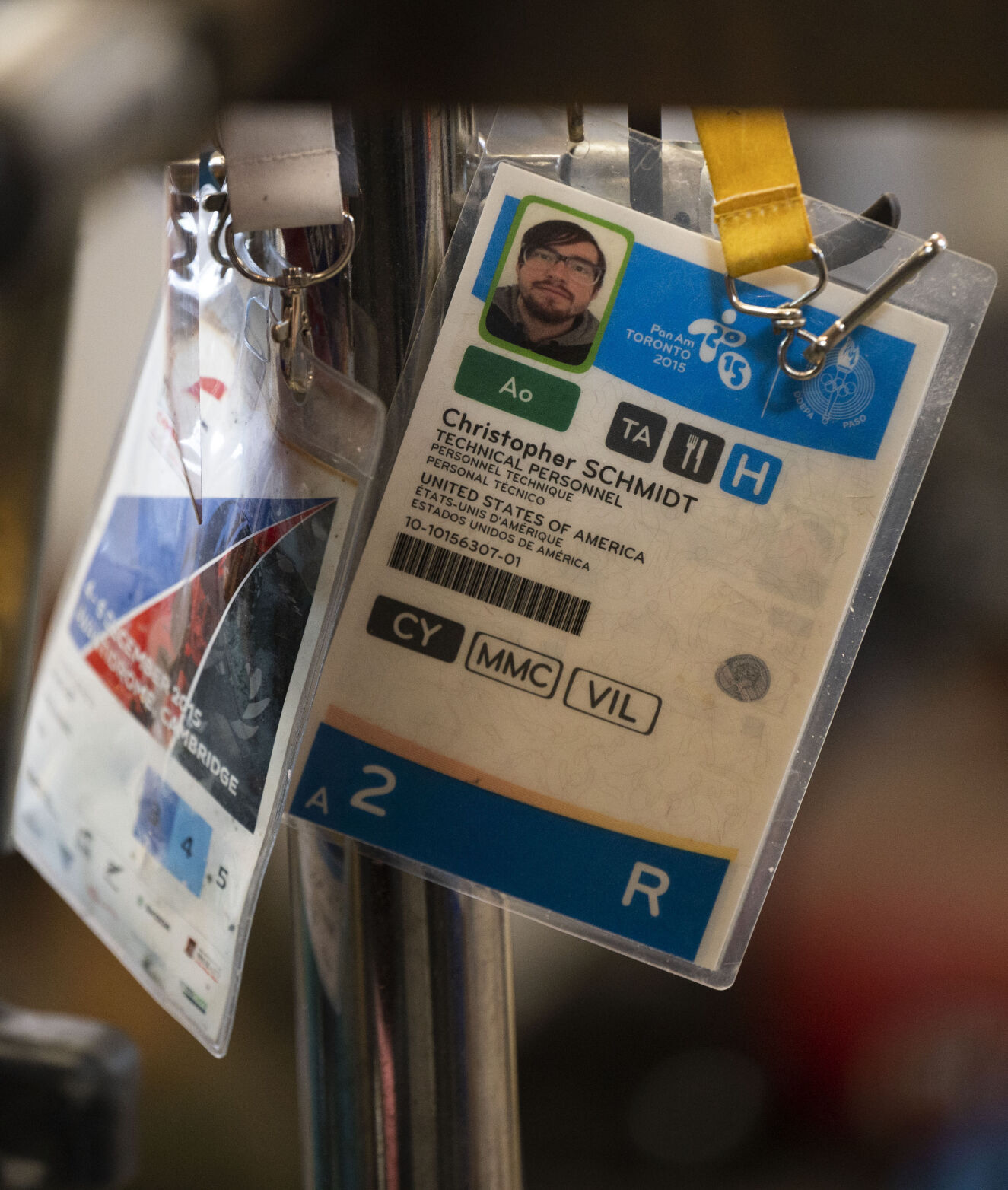
Credentials from his days working as a mechanic for the U.S. Olympic and Paralympic national cycling team hang in Chris Schmidt’s shop Friday, Jan. 5, 2024, in Colorado Springs. (The Gazette, Christian Murdock)
Christian Murdock/The Gazette

Credentials from his days working as a mechanic for the U.S. Olympic and Paralympic national cycling team hang in Chris Schmidt’s shop Friday, Jan. 5, 2024, in Colorado Springs. (The Gazette, Christian Murdock)
On a fixie, “it’s a lot more of a full body and mind experience. You have to be hyper-focused,” Andres Murcia says. “You cannot stop pedaling. … When you’re out there pedaling for hours and hours, it kind of takes you to a different place.”
Schmidt can forget things in that place — like eating, Memarian says. “I’m like, ‘You need fuel, I can feel your ribs!’”
But she knows that place to be his happy place.
That, and the workshop in their backyard.
This month Schmidt launched a company called Good Grief, the realization of a dream he dreamed years before the Olympics work.
The dream was to design and build custom frames in the likeness of a renowned master, Koichi Yamaguchi. Out of college in 2011, Schmidt learned under the precise, solitary man at his home shop in western Colorado.
With Good Grief, Schmidt is taking those skills to his own backyard: hand-drawing detailed blueprints, mostly relying on hand tools and a low-heat torch for fillet-brazing — a niche technique, unlike faster TIG welding, for joining steel tubes with bronze filler. “Kind of like a lost art,” Schmidt calls it.
He swears by the resulting aesthetic and durability. And he swears by steel, no matter it fading behind lighter carbon and titanium. (Steel bikes “are almost infinitely recyclable and repairable,” explains Good Grief’s website, while carbon “has an atrocious environmental impact, and titanium is prohibitively spendy.”)
Good Grief is old-school, says Dave Nice, the Cascade fanatic better known as “Fixie Dave” for his unwavering devotion.
“A bicycle frame builder from 100 years ago would totally recognize the tools and fixtures and things that Chris is using,” Nice says.
Old-school but progressive for the custom, hand-made approach and attention to steel and fixed-gear, says Murcia, who works for a national name in the industry, RockShox. “It’s something very original happening here in town.”
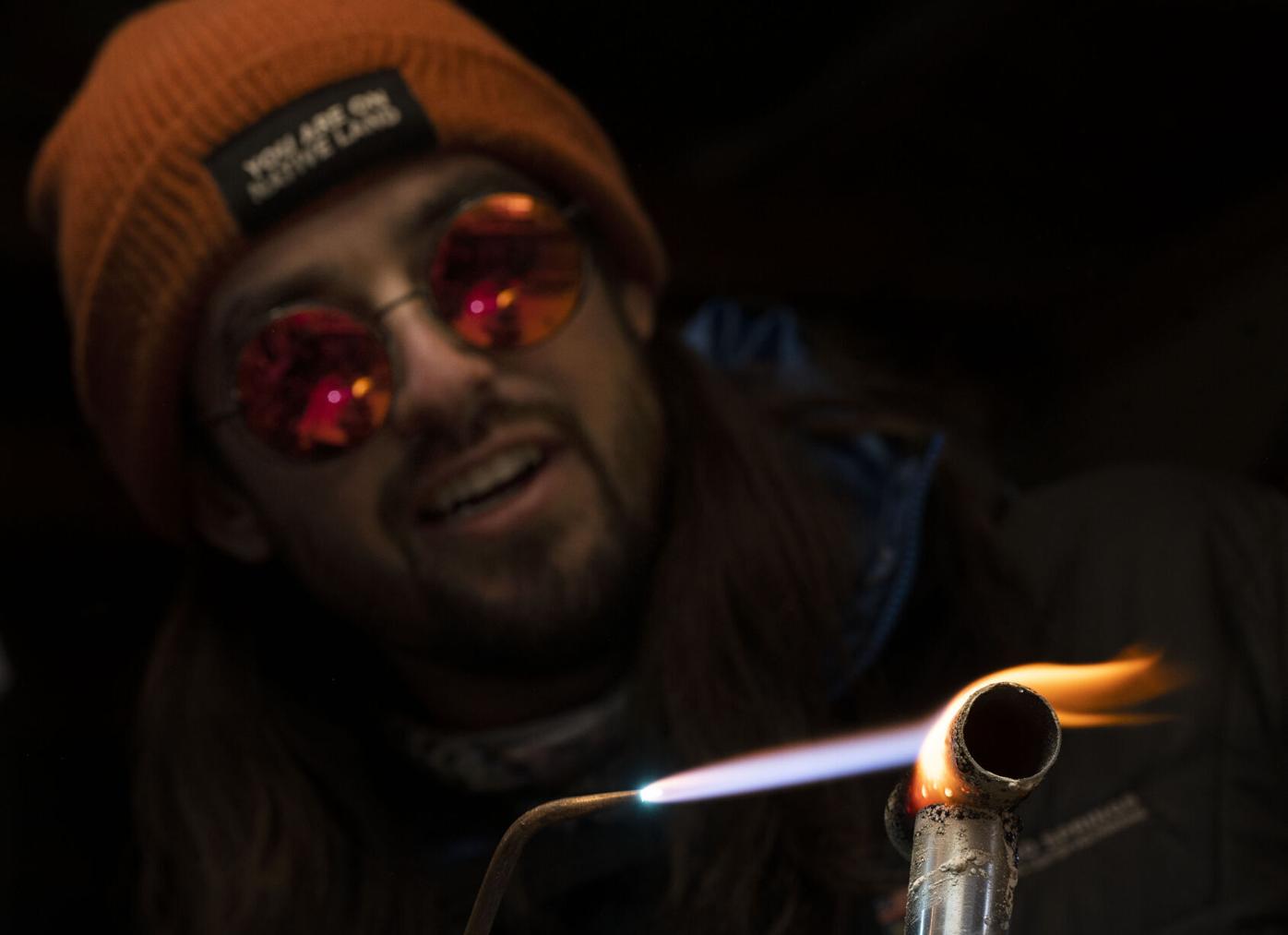
Chris Schmidt brazes together steel pipes in his shop Friday, Jan.. 5, 2024, at his Colorado Springs home. Schmidt started the company Good Grief Bicycles and designs and builds custom bicycle frames.
photos by Christian Murdock, The Gazette

Chris Schmidt brazes together steel pipes in his shop Friday, Jan.. 5, 2024, at his Colorado Springs home. Schmidt started the company Good Grief Bicycles and designs and builds custom bicycle frames.
Schmidt wouldn’t want to limit his orders to fixies. But yes, he swears by them for the same reasons “Fixie Dave” does, even in the mountains.
However brutal, “it allows you to feel the contours of the ground and see the sights,” Nice says.
He’s known Schmidt to huck rocks on fancy, full-suspension bikes, knows him to seek speeds he helped Olympians achieve. “But I think he definitely likes those opportunities to slow down and strip it back.”
That’s the idea with Good Grief. The idea for the name came from a man who remarked on Schmidt’s fixie Colorado Trail ride: “Good grief!”
The company website grants a deeper meaning: “We suppose our name could allude to the difficult yet rewarding nature of cycling, all mixed up in one — the good and the grief.”
It was only practical for Schmidt as a kid.
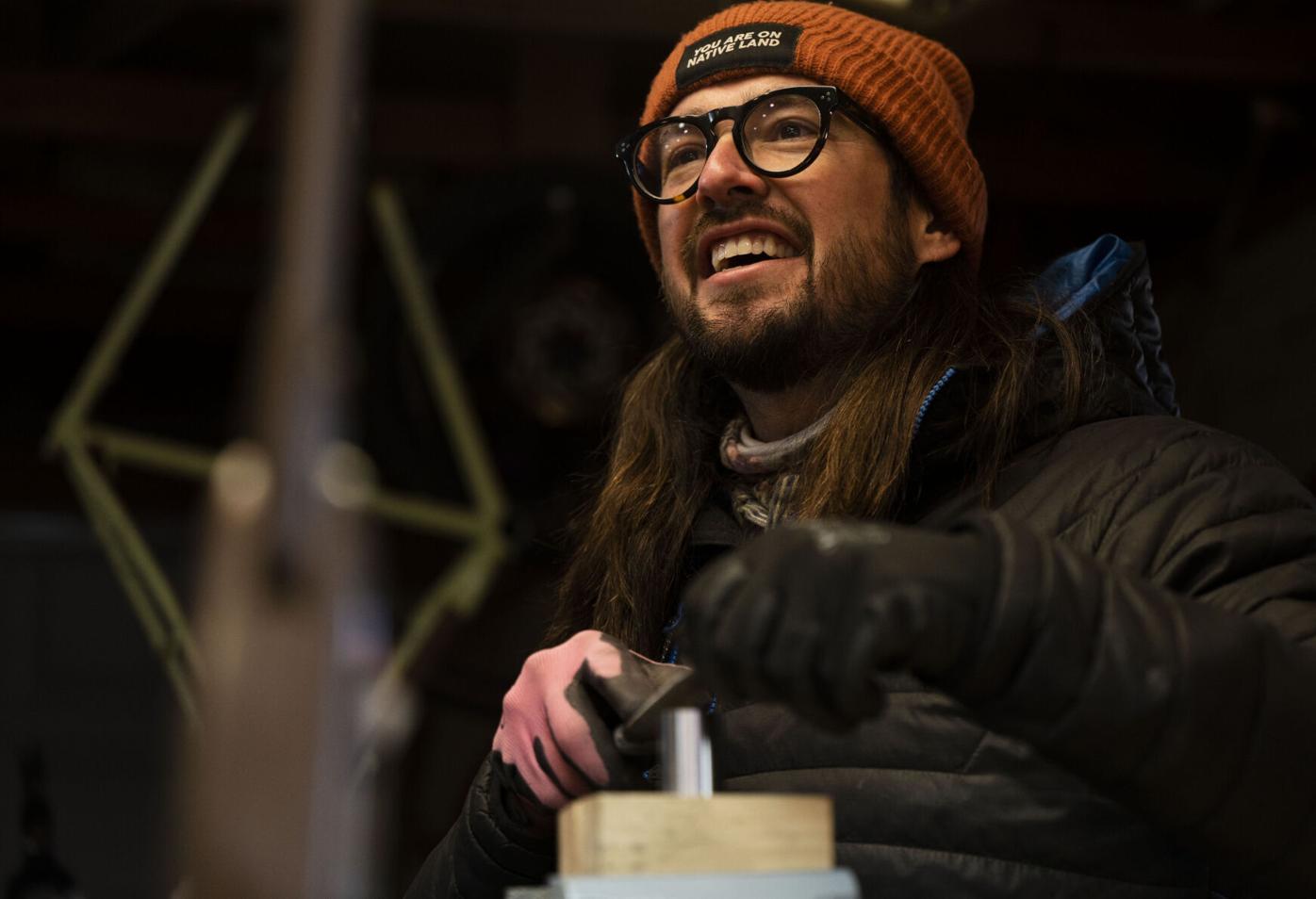
Chris Schmidt, 36, who once was a mechanic for the U.S. Olympic and Paralympic national cycling team, works in his shop Friday, Jan. 5, 2024, in Colorado Springs. Schmidt started his own business, Good Grief Bicycles, designing and building custom bicycle frames. (The Gazette, Christian Murdock)
Christian Murdock/The Gazette

Chris Schmidt, 36, who once was a mechanic for the U.S. Olympic and Paralympic national cycling team, works in his shop Friday, Jan. 5, 2024, in Colorado Springs. Schmidt started his own business, Good Grief Bicycles, designing and building custom bicycle frames. (The Gazette, Christian Murdock)
He split time between his home in Rock Springs, Wyo., where his dad worked as a miner, and visiting family at the Paiute-Shoshone Reservation in Nevada.
He rode bikes everywhere around the small reservation. Back in Rock Springs, it might’ve made more sense to get a lift to the skate park. “It was like 15 miles away,” Schmidt recalls. “I’d ride every day to the skate park and ride home.”
He found trouble along the way. He found drinking and smoking with friends to be preferable to school.
Drugs flowed into Rock Springs via Interstate 80. “As soon as ‘oxy’ came on the scene, I was 15 or 16 when it became really accessible,” Schmidt says.
It took two years at a remote, locked-down school in Montana to get clean. It took longer than that — more years of growing up and realizing the gift and curse of that stubbornness he was always told about. He was always like his grandfather, for better or for worse fixating on things.
Bikes remained one of those things. “The second I got back (from Montana) I got on my bike and went for a long ride,” Schmidt says.
The love continued upon arriving to Colorado in 2007. While attending community college in Fort Collins, Schmidt met a man who built his own bike — “the most beautiful thing I ever saw,” Schmidt says.
He resolved to build his own, to one day learn from the master he came to admire from afar. The lessons from Yamaguchi proved useful for the job later in Colorado Springs.
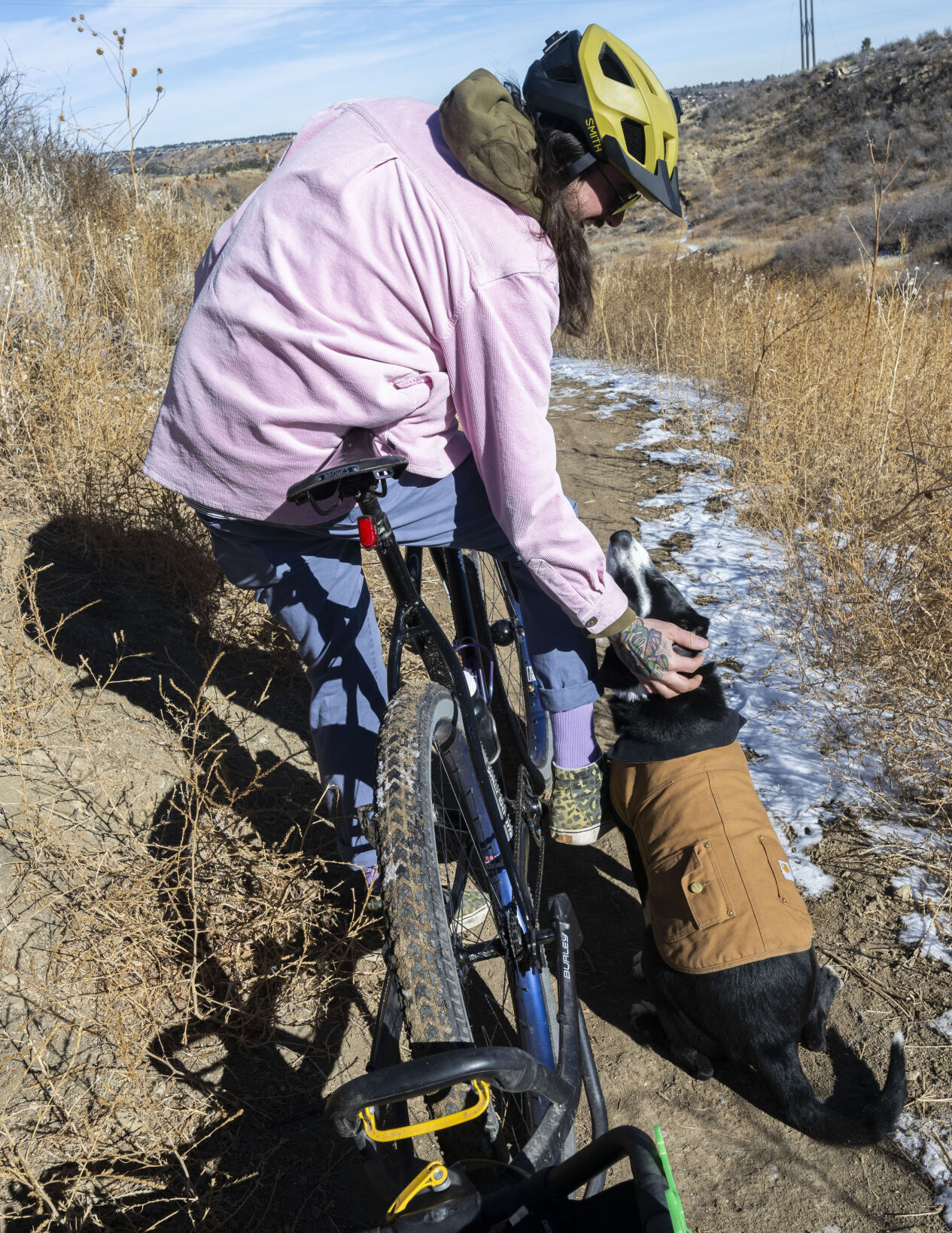
Chris Schmidt pets his dog, Eddie Merckx, while riding through Red Rock Canyon Open Space Tuesday, Jan. 9, 2024. Schmidt found his dog while on a 100-mile ride around Moab, Utah. (The Gazette, Christian Murdock)
Christian Murdock/The Gazette

Chris Schmidt pets his dog, Eddie Merckx, while riding through Red Rock Canyon Open Space Tuesday, Jan. 9, 2024. Schmidt found his dog while on a 100-mile ride around Moab, Utah. (The Gazette, Christian Murdock)
While traveling as a mechanic for the national team, Schmidt stayed busy in other ways: touring with a band, pursuing other degrees. He’s currently working on a master’s in sports and science, which would follow his master’s in sociology and bachelor’s in archaeology and anthropology. He also builds guitars and dabbles in photography and skateboards while still touring.
“I thought I was a doer until I met Chris,” his wife says. “His brain is always going.”
That’s vital, Schmidt says.
“This is totally addict mentality,” he says. “When I focus on something, I don’t think about drugs or alcohol or anything at all. As soon as I’m bored is when bad things happen.”
He speaks of “trying to find that balance in my adult life.” Of “staying busy enough to stay sober” while also being available to his wife. “I love you more than bikes,” he said at their wedding.
She understands those long hours in the Good Grief workshop. “He gets into this zen, hyper-focused state,” she says.
He’ll tinker into the night sometimes. He’s often joined by his dog, Eddy Merckx, named for the legendary Belgian cyclist. Eddy, Schmidt says, needs to run like him, explaining their long adventures together. “One year, he got like 5,000 miles in,” Schmidt says.
But Eddy is patient in the shop while Schmidt toils over various minutiae of custom frames: the millimeters and degrees detailed on a blueprint, the time-consuming sketch before the slow, careful build by hand.
“I try to over-engineer every measurement I need so that I have a million different points I can look at,” Schmidt says.
The hard way, one might say. The right way.





